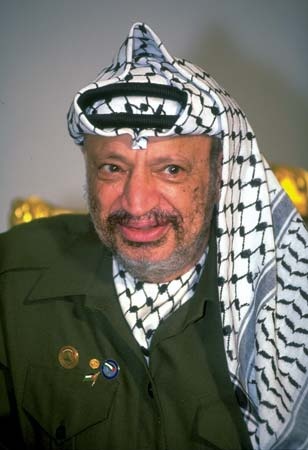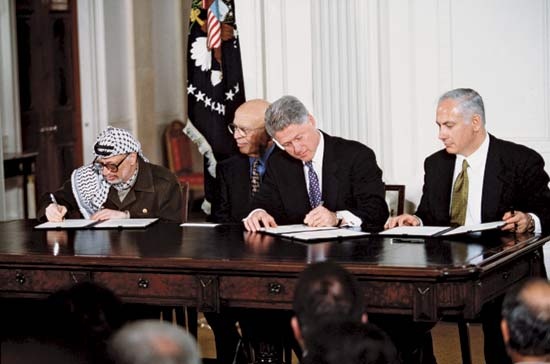Arafāt, Yāsirʿ
Palestinian leader
byname of Muḥammad ʿAbd al-Raʾūf al-Qudwah al-Ḥusaynī
born August 24?, 1929, Cairo?, Egypt
died November 11, 2004, Paris, France
president (1996–2004) of the Palestinian Authority, chairman (1969–2004) of the Palestine Liberation Organization (PLO), and leader of Fatah, the largest of the constituent PLO groups. In 1993 he led the PLO to a peace agreement with the Israeli government. ʿArafāt and Yitzhak Rabin (Rabin, Yitzhak) and Shimon Peres (Peres, Shimon) of Israel were jointly awarded the Nobel Prize for Peace in 1994.
ʿArafāt was one of seven children of a well-to-do merchant whose wife was related to the anti-Zionist grand mufti of Jerusalem, Amīn al-Ḥusaynī (died 1974). The date and place of ʿArafāt's birth are disputed. A birth certificate registered in Cairo, Egypt, gives August 24, 1929. Some sources, however, have supported ʿArafāt's claim to have been born in Jerusalem on August 4, 1929, and still others have given Gaza, Palestine, as his birthplace. ʿArafāt attended the University of Cairo, graduating as a civil engineer. He joined the Muslim Brotherhood and the Union of Palestinian Students, of which he was president (1952–56), and was commissioned into the Egyptian army. In 1956 he served in the Suez campaign.
After Suez, ʿArafāt went to Kuwait, where he worked as an engineer and set up his own contracting firm. In Kuwait he helped found Fatah, which was to become the leading military component of the PLO. After being named chairman of the PLO in 1969, he became commander in chief of the Palestinian Revolutionary Forces in 1971 and, two years later, head of the PLO's political department. Subsequently, he directed his efforts increasingly toward political persuasion rather than confrontation and terrorism against Israel. In November 1974 ʿArafāt became the first representative of a nongovernmental organization—the PLO—to address a plenary session of the United Nations General Assembly.
In 1982 ʿArafāt became the target of criticism from Syria and from various Syrian-supported factions within the PLO. The criticisms escalated after the Israeli invasion of Lebanon forced ʿArafāt to abandon his Beirut headquarters at the end of August 1982 and set up a base in Tunisia and later in Baghdad, Iraq. ʿArafāt was subsequently able to reaffirm his leadership as the split in the PLO's ranks healed.
 On April 2, 1989, ʿArafāt was elected by the Central Council of the Palestine National Council (the governing body of the PLO) to be the president of a hypothetical Palestinian state. In 1993 ʿArafāt took a further step toward peace when, as head of the PLO, he formally recognized Israel's right to exist and helped negotiate the Israel-PLO accord, which envisaged the gradual implementation of Palestinian self-rule in the West Bank and Gaza Strip over a five-year period. ʿArafāt began directing Palestinian self-rule in 1994, and in 1996 he was elected president of the Palestinian Authority, which governed Palestinian-controlled areas of the West Bank and the Gaza Strip.
On April 2, 1989, ʿArafāt was elected by the Central Council of the Palestine National Council (the governing body of the PLO) to be the president of a hypothetical Palestinian state. In 1993 ʿArafāt took a further step toward peace when, as head of the PLO, he formally recognized Israel's right to exist and helped negotiate the Israel-PLO accord, which envisaged the gradual implementation of Palestinian self-rule in the West Bank and Gaza Strip over a five-year period. ʿArafāt began directing Palestinian self-rule in 1994, and in 1996 he was elected president of the Palestinian Authority, which governed Palestinian-controlled areas of the West Bank and the Gaza Strip.
 In mid-1996 Israeli-Palestinian relations became acrimonious with the election of Israeli Prime Minister Benjamin Netanyahu (Netanyahu, Benjamin), who favoured a slower transition to self-rule. Growing distrust between ʿArafāt and Netanyahu resulted in a 19-month-long deadlock, and in 1998 U.S. President Bill Clinton (Clinton, Bill) intervened, arranging a summit meeting with the two leaders at Wye Mills, Maryland. The resulting Wye Memorandum detailed the steps to be taken by Israel and Palestine to complete the peace process. ʿArafāt pledged to continue the process with Netanyahu's successor, Ehud Barak (Barak, Ehud).
In mid-1996 Israeli-Palestinian relations became acrimonious with the election of Israeli Prime Minister Benjamin Netanyahu (Netanyahu, Benjamin), who favoured a slower transition to self-rule. Growing distrust between ʿArafāt and Netanyahu resulted in a 19-month-long deadlock, and in 1998 U.S. President Bill Clinton (Clinton, Bill) intervened, arranging a summit meeting with the two leaders at Wye Mills, Maryland. The resulting Wye Memorandum detailed the steps to be taken by Israel and Palestine to complete the peace process. ʿArafāt pledged to continue the process with Netanyahu's successor, Ehud Barak (Barak, Ehud).In 2000, in talks mediated by Clinton at Camp David, where the historic Camp David Accords between Israel and Egypt were negotiated in 1978, ʿArafāt rejected an offer by Barak that would have created an independent Palestinian state because it did not grant the Palestinians full control over East Jerusalem or adequately guarantee, in his view, the right of Palestinian refugees to return. ʿArafāt's decision was widely hailed by Palestinians, and Barak was ousted from office in 2001 by Ariel Sharon (Sharon, Ariel), whose visit to the Temple Mount in Jerusalem in September 2000 had sparked a wave of Palestinian violence. In 2001, following suicide attacks in Israel that Sharon blamed ʿArafāt for instigating, ʿArafāt was confined by Israel to his headquarters in Ramallah. In October 2004 ʿArafāt fell ill and was transported for medical treatment to Paris, where he died the following month.
Additional Reading
ʿArafāt's life and achievements are chronicled in Alan Hart, Arafat: A Political Biography (1989); Danny Rubinstein, The Mystery of Arafat (1995); and Janet Wallach and John Wallach, Arafat: In the Eyes of the Beholder, rev. and updated ed. (1997).
- Harold Dwight Lasswell
- Harold E. Edgerton
- Harold Frederic
- Harold Gray
- Harold H. Burton
- Harold Holt
- Harold I
- Harold II
- Harold Joseph Laski
- Harold L Ickes
- Harold Lloyd
- Harold Macmillan
- Haroldo de; and Campos, Augusto de Campos
- Haroldo de; and Campos Campos, Augusto de
- Harold Pinter
- Yi Sang-cha
- Yisrael Galili
- Yi Sun-shin
- Yitzhak Rabin
- Yitzhak Zuckerman
- Yitzḥak Shamir
- Yiyang
- yizkor
- ylang-ylang
- Ynes Enriquetta Julietta Mexia